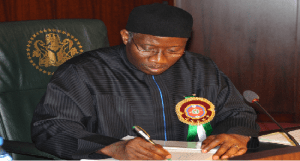 The National Assembly Constitution Review Committee on Wednesday commenced a two-day retreat to consider observations made by President Goodluck Jonathan on the Fourth Alteration Bill, 2015 over which he withheld his assent.
The National Assembly Constitution Review Committee on Wednesday commenced a two-day retreat to consider observations made by President Goodluck Jonathan on the Fourth Alteration Bill, 2015 over which he withheld his assent.
Federal and State lawmakers had approved some sections in the
constitution for amendment and sent it to the president for assent.
But President Jonathan vetoed some of the sections and returned it to the National Assembly.The members of the National Assembly had not foreseen a situation where President Jonathan would refuse to assent to some sections of the constitution they had amended.
President Jonathan wrote to the National Assembly detailing the sections which he refused to approve.
In the letter read by the Senate President, President Jonathan rejected the alteration of section nine of the constitution which removes the approval of the President in the process of constitution amendment.
President Jonathan also rejected the amendment which separated the office of the Attorney General of the Federation from the Minister of Justice and the Attorney General from the Commissioner for Justice in the respective states of the Federation.
For nearly three years, the Seventh National Assembly has been working to amend the constitution spending billions of Naira in the process.
But President Jonathan vetoing some of the amendments is a major setback for Federal lawmakers.
 The lawmakers plan to hold a two day retreat to discuss the matter
and Nigerians are eager to know what their next action would be.
The lawmakers plan to hold a two day retreat to discuss the matter
and Nigerians are eager to know what their next action would be.President Jonathan had lost a re-election an election held on March 28 to the candidate of the opposition All Progressives Congress, General Muhammadu Buhari.
The purpose of the retreat is to critically examine Jonathan’s observations and come up with a resolution at the end of the retreat on Thursday. The Committee is chaired by the Deputy President of the Senate, Senator Ike Ekweremadu.
Senate President, David Mark, at Wednesday’s plenary, said he received a letter from the president on his reasons for withholding assent to the bill.
He said that Jonathan had observed that some provisions of the proposed law violated the doctrine of separation of powers as enshrined in the 1999 Constitution.
Jonathan’s letter also noted that some provisions of the proposed law whittled the powers of the federation vested in the president of the Federal Republic of Nigeria by virtue of Section 5(1) of the 1999 Constitution, as amended.
The letter further noted that there was no credible evidence that Section 4 of the bill, which dispenses with the assent of the president in the process of constitutional amendment.
“Section 4 of the Fourth Alteration Act, 2015 can only be valid if the proposal was supported by the votes of not less than four-fifths majority of all the members of each house of the National Assembly.
“And approved by a resolution of the House of Assembly of not less than two-thirds of all the states as provided by Section 9(3) of the 1999 Constitution.
“In the absence of credible evidence that this requirement was met in the votes and proceedings of the National Assembly, it will be unconstitutional for me to assent to this bill,’’ the letter stated.
Also, Jonathan observed that Section 45 A of the bill, which guarantees the right to free basic education, was too open-ended and should be restricted to government schools.
Section 58, which provides that a bill will become law after expiration of 30 days of non-assent by the president was said not to have taken cognizance of some important variables.
Also, Section 84, which creates the Office of the Accountant General distinct from Account-General of the Federation, does not address funding requirements for the office.
The president’s letter also observed that the separation of the Attorney General’s office from that of Minister of Justice violated the doctrine of the separation of power.

No comments:
Post a Comment